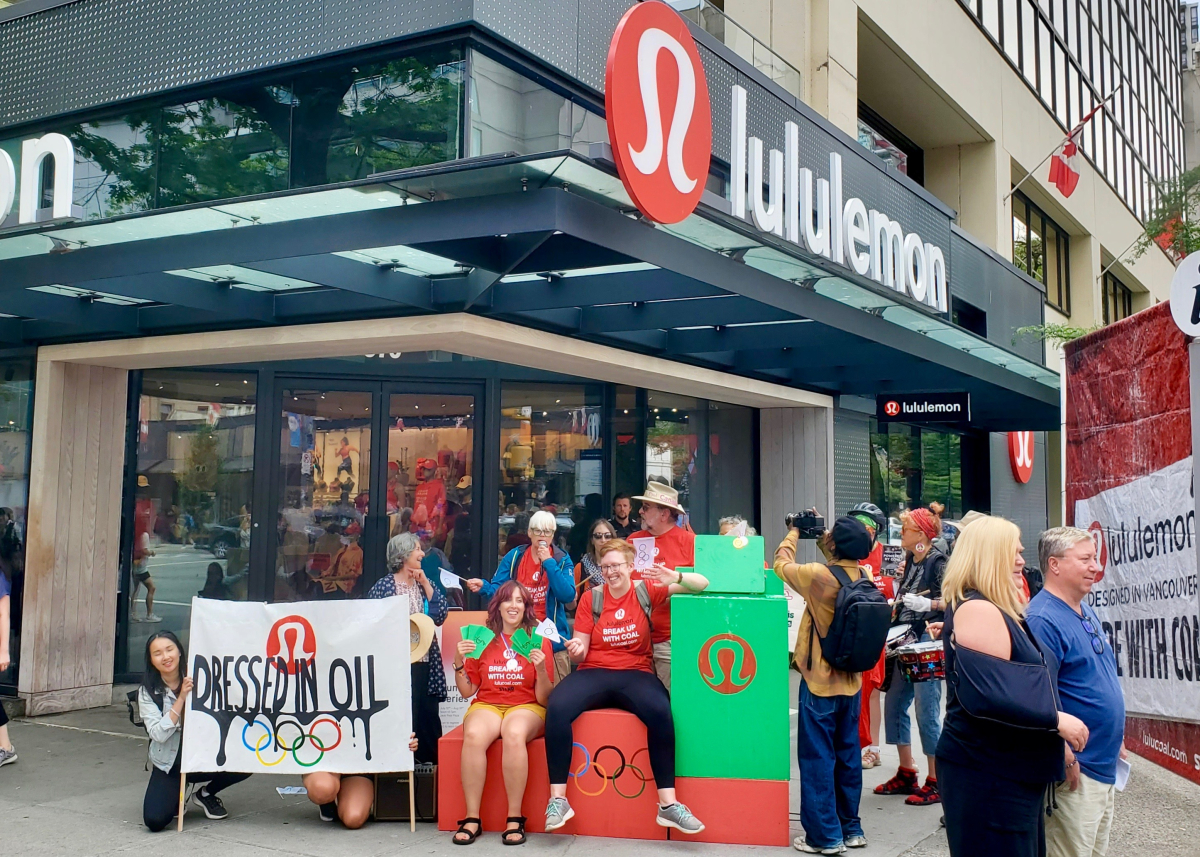Support strong Canadian climate journalism for 2025
Just days before the Paris Olympics open, Lululemon Athletica Inc. is facing a first-of-its-kind formal complaint in France filed by a grassroots environmental organization in Canada and the United States.
Team Canada athletes will be outfitted by Vancouver-based Lululemon in the Olympics.
Filed on July 24, it’s the second such complaint against the clothing company by Stand.earth. The activist group filed its first anti-competition complaint against Lululemon with the Canadian Competition Bureau in February. The complaint requested that an inquiry be made into Lululemon’s conduct, as the company dons a “Be Planet” slogan along with corporate messaging that their “products and actions avoid environmental harm and contribute to restoring a healthy planet” — but also reports rising emissions.
In April, the bureau opened an investigation into Lululemon for misleading public representations of the company’s environmental impact.
Wren Montgomery, associate professor at Western University and a greenwashing researcher, told Canada’s National Observer that she owns Lululemon apparel. “Would I have guessed that 60 per cent of the items were made with fossil fuels before? No, and that doesn’t align with that ‘Be Planet’ messaging.”
Now, Stand.earth has filed a second complaint, this time with the French competition and consumer affairs bureau, the DGCCRF. The complaint demands that the company repeal its “Be Planet” slogan and align marketing with its actual environmental impact. It is expected to be reviewed by the regulator in coming days.
In the two years following the launch of its “Be Planet” slogan in 2020, Lululemon’s emissions nearly doubled, according to its impact reports. The factories of the apparel titan’s suppliers are also largely powered by fossil fuels, and more than half of the materials used to make Lululemon’s products are derived from fossil fuels and cannot be effectively recycled.
While Stand.earth’s complaint acknowledges that Lululemon has made steps toward sustainability, it says the impression given by the company’s marketing campaign is inconsistent with its actions, and misleads consumers into believing that purchasing clothing from Lululemon will positively contribute to, or at least not damage, a healthy environment.
Montgomery explained to Canada’s National Observer that companies most often fall into greenwashing by giving similarly vague impressions of environmental friendliness.
“With greenwashing, we’re not usually talking about outright lying. We’re talking about all these squishy ways that firms find to not exactly lie, but confuse you. To give you this overly positive impression,” she said.
Lying plainly to consumers is usually illegal under consumer protection laws around the world. Montgomery explained that the academic definition for greenwashing encompasses cases like these, where an illusion of environmental friendliness is created through packaging, selective disclosure around eco-conscious practices or marketing like “Be Planet.” Such strategies typically fall into a legal grey area.
Recently though, legal definitions around greenwashing have been expanding. In June, new greenwashing provisions for the Competition Act became law in Canada, making false or misleading marketing illegal. The EU also cracked down on greenwashing earlier this year, passing a directive in February which will better protect consumers from disingenuous claims made by corporations about eco-consciousness.
Stand.earth’s complaint will be the first opportunity for the French government to test the new European legislation on a fashion brand, according to Rachel Kitchin, senior corporate climate campaigner with Stand.earth.
“We see this as a really important jurisdiction, as Lululemon expands and grows its presence in Europe,” Kitchin said.
France is one of just a few countries that has criminalized greenwashing. In 2021, the country’s criminal sanctions increased, making companies that are found to have greenwashed susceptible to fines of up to 80 per cent of the cost of their marketing campaign.
However, according to Kitchin, the chance is low that Stand.earth’s complaint will result in criminal charges laid against Lululemon in France. A fine is much more likely. Should the regulator find that Lululemon made false or misleading claims about its environmental impact, the company could be fined up to 10 per cent of its annual turnover, she explained.
To draw eyes before their complaint was filed, Stand.earth staged a demonstration outside Lululemon’s flagship Vancouver store on Monday. A mock Olympic medal ceremony called out the company for greenwashing, which conflicts with Team Canada’s prior environmentally-conscious commitments, according to Stand.earth campaigner Erdene Batzorig.

Since 2020, Team Canada has been a signatory of the United Nations Sport for Climate Action Framework, a commitment to halve emissions by 2030 through effective action.
“This is really about trying to push Lululemon to be more aligned with what Team Canada is trying to do, what Canada is aiming to stand for on the world stage,” Kitchin said.
In an emailed statement to Canada’s National Observer, a Canadian Olympic Committee representative wrote, “Team Canada is proud to partner with an iconic Canadian brand that shares our values, including a demonstrable commitment to sustainability. The Paris 2024 team kit was designed with a focus on sustainability and includes the use of preferred materials.”
The fashion industry produces between eight and 10 per cent of global greenhouse gas emissions each year. Consumers know this, Montgomery explained, and want to feel good about what they are buying, which is the incentive for companies to either go green — like H&M and Puma, which say they are transitioning their supply chains to renewable energy models — or to engage in greenwashing instead.
“We would love to see Lululemon make its claims true. That's the basic answer to all of this,” said Kitchin.
Canada’s National Observer reached out to Lululemon for a comment but did not receive a response before publication time.





Comments